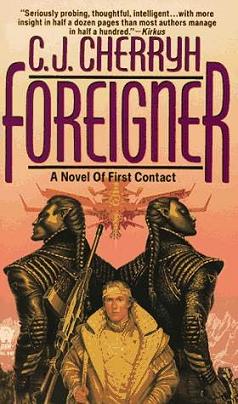
Foreigner
C. J. Cherryh
423 pages
published in 1994
Foreigner is the fifth book in my Year of Reading Women project. It is the first novel in one of C. J. Cherryh's more popular series, yet until now I had never read any of them. She is such a prolific writer that it's easy to miss a series or two. She also has such a wide range, writing anything from fantasy to space opera, that not everything she writes appeals to every one of her fans. The number of people I've known who hated her breakthrough novel Downbelow Station for example...
Yet, once you've read a few of her novels, you discover that there is one narrative trick all her stories have in common, no matter what the setting or the plot is. What she likes to do is to take her protagonists out of their comfort zone, get them at their most vulnerable and then put the pressure on. Every one of her novels I've read has the same structure. The protagonist is a young man (rarely a young woman) put in a position of responsibility but without power. Usually he's an outsider in an alien culture, cut off from his own people, in the middle of some sort of political crisis he barely understands let alone can influence. She then let's this crisis heats up, makes sure her hero gets little to eat and less sleep and is as far removed from the centre of the crisis as possible, yet still has a vital role to play in resolving it, even if he not necessarily knows it. To make sure the reader is as much in the dark as the hero, she usually makes sure they're only looking at the story through his eyes.
In Foreigner's case the eyes we're looking through are Bren Cameron's. Bren is the paidhi, the human interpretor appointed by treaty to the court of the aiji of the Western Association. The paidhi is the person the most responsible for keeping the peace between human and Atevi ever since the war twohundred years earlier. It been an accident that had put humans on the Atevi's planet and many of the latter were still not happy about it, but at least they were now confined to only one island and forced to share their technological and scientific knowledge. It's this that is the humans' greatest advantage and it's Bren's job to share them in the most advantageous way possible, striking a balance between being useful to the Atevi, not forcing their technological development too soon and keeping at least some bargaining chips off the table for as long as possible.
Not an easy job, but things get worse for Bren quick. His story starts with an assassin in his room and Bren driving him off with an illegal gun. In response Tabini-aiji order's Bren's bodyguards to bring him to his grandmother's castle -- the one who twice tried to be aiji instead of her son and grandson and who might have been involved in the tragic death of her own son, but who in any case doesn't like humans very much.
Alone, isolated and confused, cut off from the modern world in a castle that was old when humans first went into space and only barely upgraded to include modern amenities like indoor plumbing and electricity, Bren is not happy. His existential dillemma is that his instinct is to trust and like those atevi like Jago and Banichi, his two bodyguards, he has known and worked with for years, yet these are human emotions not mirrorred by the atevi. Their language can only think about "like" in the sense that you can like a the breakfast fruit, but does have fourteen different words for betrayal. Instead Atevi are ruled by man'chi, the sense of duty and obligation owned to an association or leader, which can get very complicated indeed. It's the conflict between Bren's instincts and feelings and his imperfect understanding of man'chi that drives most of the stress he's under. Literally kept in the dark at times, he has no idea what's going on, what his own role in it is or how to get out from the hole he is in.
Foreigner is one of those Cherryh novels that was difficult to read for me, because I could see the pain that was coming for Bren all the time and was wincing in advance. I'd figured out Cherryh's trick it took me some effort to get back to the story. I also had some problems with the setting. The Atevi with their sense of man'chi and lack of emotions and complex web of aristocratical power relations come across as "space Japanese", with the human settlement standing in for the Dutch at Dejima during the Shogunate. It took some time for me to get over this.
What I also had problems with was the central conciet in the story, that it would be possible to trade scientific and technological information for twohundred years without the Atevi catching up and surpassing humans. Cherryh does play some lip service to the idea that the Atevi do innovate on their own as well, but it does seem humans are the main driver of scientific progress, which I just don't buy. Science doesn't work that way, you cannot just keep parceling out little nuggets of information like that without sparking off a scientific revolution. Especially on a planet with a few million humans and a billion or more Atevi.
Setting aside those objections, once I did immerse myself in the story, it was just as gripping as any other Cherryh one. This isn't her best novel perhaps, but like most Cherryh novels it's still very much worth reading.
Webpage created 22-05-2011, last updated 25-05-2011.